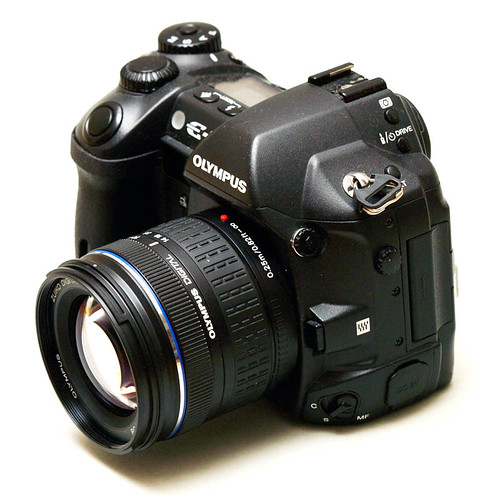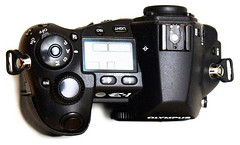Difference between revisions of "Olympus E-1"
m (minor links) |
|||
| Line 2: | Line 2: | ||
[http://www.flickr.com/photos/timmythesuk/481136818/in/pool-camerapedia/ http://farm1.static.flickr.com/218/481136818_1adea44045.jpg] | [http://www.flickr.com/photos/timmythesuk/481136818/in/pool-camerapedia/ http://farm1.static.flickr.com/218/481136818_1adea44045.jpg] | ||
''[http://www.flickr.com/search/groups/?w=46195334%40N00&q=olympus+e-1&m=pool Other Images]''</div> | ''[http://www.flickr.com/search/groups/?w=46195334%40N00&q=olympus+e-1&m=pool Other Images]''</div> | ||
| − | Announced in June 2003, the Olympus E-1 was the first interchangeable lens DSLR for the [[Four-Thirds]] system. Released at a premium price point, the E-1 was aimed at the professional market and as such features dust and water-resistant weather-sealing (to match the majority of pro-level [[Four-Thirds lenses]]) and very high build quality and robustness, along with Olympus' patented SSWF dust reduction system. The camera features twin control dials, an external white-balance sensor, an external x-contact port and can be used with a vertical battery grip attachment. | + | Announced in June 2003, the [[Olympus]] E-1 was the first interchangeable lens [[DSLR]] for the [[Four-Thirds]] system. Released at a premium price point, the E-1 was aimed at the professional market and as such features dust and water-resistant weather-sealing (to match the majority of pro-level [[Four-Thirds lenses]]) and very high build quality and robustness, along with Olympus' patented SSWF dust reduction system. The camera features twin control dials, an external white-balance sensor, an external x-contact port and can be used with a vertical battery grip attachment. |
<div class="floatright plainlinks" style="text-align: center;"> | <div class="floatright plainlinks" style="text-align: center;"> | ||
[http://www.flickr.com/photos/timmythesuk/481146139/in/pool-camerapedia/ http://farm1.static.flickr.com/197/481146139_b0064fd06b_m.jpg]</div> | [http://www.flickr.com/photos/timmythesuk/481146139/in/pool-camerapedia/ http://farm1.static.flickr.com/197/481146139_b0064fd06b_m.jpg]</div> | ||
| − | Featuring a 5 megapixel CCD with the 4:3 aspect ratio, the E-1 has the same sized sensor as all cameras that share the Four-Thirds mount. Unlike all Four-Thirds cameras since its release, the viewfinder in the E-1 is larger and offers 100% frame coverage – one of the main criticisms of the other cameras using the small Four-Thirds sensor. | + | Featuring a 5 [[megapixel]] [[CCD]] with the 4:3 aspect ratio, the E-1 has the same sized sensor as all cameras that share the Four-Thirds mount. Unlike all Four-Thirds cameras since its release, the viewfinder in the E-1 is larger and offers 100% frame coverage – one of the main criticisms of the other cameras using the small Four-Thirds sensor. |
E-1s have been used in various harsh environments such as deserts and war zones, and as of 2007 remain reportedly one of the toughest SLRs ever produced. | E-1s have been used in various harsh environments such as deserts and war zones, and as of 2007 remain reportedly one of the toughest SLRs ever produced. | ||
| Line 12: | Line 12: | ||
Some brief specifications: | Some brief specifications: | ||
| − | * 5 Megapixel CCD sensor — image dimensions up to 2560 × 1920 | + | * 5 [[Megapixel]] [[CCD|CCD sensor]] — image dimensions up to 2560 × 1920 [[pixel]]s (4.9mp effective) |
| − | * 1.8” rear LCD panel (134,000 pixels; 100% frame coverage) | + | * 1.8” rear [[LCD]] panel (134,000 pixels; 100% frame coverage) |
* Olympus' patented 'Supersonic Wave Filter' anti-dust system | * Olympus' patented 'Supersonic Wave Filter' anti-dust system | ||
| − | * Metering: 49 area ESP, Centre-weighted average, Spot (1.8%) | + | * [[Light meter|Metering]]: 49 area ESP, Centre-weighted average, Spot (1.8%) |
* External white-balance sensor | * External white-balance sensor | ||
| − | * Single AF, continuous AF and manual focusing with all Four-Thirds lenses | + | * Single [[autofocus|AF]], continuous AF and manual focusing with all [[Four-Thirds]] lenses |
* Sequential shooting at 3fps up to 12 frames | * Sequential shooting at 3fps up to 12 frames | ||
| − | * ISO range 100–3200. | + | * [[Film speed|ISO range]] 100–3200. |
| − | * Program, Aperture Priority, Shutter Priority and Manual shooting modes | + | * Program, [[Aperture priority|Aperture Priority]], [[Shutter priority|Shutter Priority]] and Manual shooting modes |
* Takes CompactFlash (Type I/II or MD) type memory cards | * Takes CompactFlash (Type I/II or MD) type memory cards | ||
* No inbuilt flash | * No inbuilt flash | ||
Revision as of 12:46, 21 May 2008
Announced in June 2003, the Olympus E-1 was the first interchangeable lens DSLR for the Four-Thirds system. Released at a premium price point, the E-1 was aimed at the professional market and as such features dust and water-resistant weather-sealing (to match the majority of pro-level Four-Thirds lenses) and very high build quality and robustness, along with Olympus' patented SSWF dust reduction system. The camera features twin control dials, an external white-balance sensor, an external x-contact port and can be used with a vertical battery grip attachment.
Featuring a 5 megapixel CCD with the 4:3 aspect ratio, the E-1 has the same sized sensor as all cameras that share the Four-Thirds mount. Unlike all Four-Thirds cameras since its release, the viewfinder in the E-1 is larger and offers 100% frame coverage – one of the main criticisms of the other cameras using the small Four-Thirds sensor.
E-1s have been used in various harsh environments such as deserts and war zones, and as of 2007 remain reportedly one of the toughest SLRs ever produced.
A successor to the E-1 was released in Nov 07 and is called the E-3.
Some brief specifications:
- 5 Megapixel CCD sensor — image dimensions up to 2560 × 1920 pixels (4.9mp effective)
- 1.8” rear LCD panel (134,000 pixels; 100% frame coverage)
- Olympus' patented 'Supersonic Wave Filter' anti-dust system
- Metering: 49 area ESP, Centre-weighted average, Spot (1.8%)
- External white-balance sensor
- Single AF, continuous AF and manual focusing with all Four-Thirds lenses
- Sequential shooting at 3fps up to 12 frames
- ISO range 100–3200.
- Program, Aperture Priority, Shutter Priority and Manual shooting modes
- Takes CompactFlash (Type I/II or MD) type memory cards
- No inbuilt flash
- Weight: 660g (body only)
- Size: 141 × 104 × 81mm
Links
- Specs and full review at DP Review
- First and second review at The Luminous Landscape
- Review at Steve's Digicams
- Olympus E-system at John Foster's Biofos website
- Olympus E-system at Andrzej Wrotniak's photo website
- Olympus E-1 at Lonestardigital

